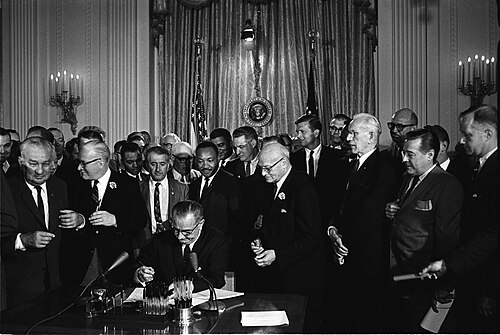
Back مجتمع عظيم Arabic Вялікае грамадства Byelorussian Велико общество Bulgarian Great Society German Gran Sociedad Spanish Gizarte Handia Basque جامعه بزرگ Persian Great Society Finnish Grande société de Johnson French Nagyszerű Társadalom Hungarian

The Great Society was a series of domestic programs enacted by President Lyndon B. Johnson in the United States between 1964 and 1968, aimed at eliminating poverty, reducing racial injustice, and expanding social welfare in the country. Johnson first used the phrase in a May 7, 1964, speech at Ohio University. The Great Society aimed to build on the legacy of former President Franklin D. Roosevelt's New Deal reforms of the 1930s, and sought to use the power of the federal government in order to address economic inequality, improve education and healthcare, and promote civil rights.
The post–World War II economic expansion had raised living standards for many Americans, but significant disparities remained, particularly for racial minorities and those living in impoverished rural and urban areas. The civil rights movement was gaining momentum, highlighting systemic racism and discrimination. Some of the Great Society initiatives were derived from New Frontier proposals which had stalled during the administration of John F. Kennedy, whom Johnson had succeeded in 1963.[1] Johnson's success depended on his skills of persuasion and the Democratic Party's landslide victory in the 1964 elections, which made the 89th Congress the most liberal since 1938, with a supermajority in both chambers.[2][1]
The core programs of the Great Society focused on a "war on poverty" which increased federal involvement in education, employment, and healthcare. The Economic Opportunity Act of 1964 created a Job Corps and Volunteers in Service to America; the Food Stamp Act of 1964 provided low-income people assistance in purchasing food; the Elementary and Secondary Education Act of 1965 authorized federal expenditure on schools with low-income students; and the Social Security Amendments of 1965 created Medicaid, which funds some medical costs for low-income individuals, and Medicare, a health insurance program for people aged 65 and over. Measures designed to end racial injustice included the Civil Rights Act of 1964, which prohibited racial segregation in schools, public spaces, and workplaces; the Voting Rights Act of 1965, which ensured that minorities could exercise their right to vote; the Immigration and Nationality Act of 1965, which abolished quotas based on national origin and placed a greater emphasis on skills and links to U.S. citizens; and the Civil Rights Act of 1968, which prohibited housing discrimination. Additional projects included the National Endowment for the Arts; consumer protection measures; the Housing and Urban Development Act of 1965, which expanded the federal housing program; the Motor Vehicle Air Pollution Control Act of 1965, which limited motor vehicle emissions; and the National Trails System Act of 1968, which created a system of hiking trails.
Many of the Great Society projects were opposed by Republicans, who objected to what they considered "government handouts". Johnson's popularity declined as he committed more troops to the Vietnam War, which drew on resources that could have been directed toward the Great Society. Some projects were expanded under the administrations of Republican presidents Richard Nixon and Gerald Ford while others were dismantled, and funding for many were cut by Ronald Reagan.[3] From 1963 to 1970, the portion of Americans living below the poverty line declined from 22.2 to 12.6 percent.
- ^ a b Zelizer, Julian E. (2015). The fierce urgency of now : Lyndon Johnson, Congress, and the battle for the Great Society. New York. ISBN 978-1-59420-434-0. OCLC 881094066.
{{cite book}}: CS1 maint: location missing publisher (link) - ^ Life, November 5, 1965
- ^ Riley, Jason L. (2008). Let Them In: The Case for Open Borders. Gotham Books. p. 98. ISBN 9781592403493.
© MMXXIII Rich X Search. We shall prevail. All rights reserved. Rich X Search